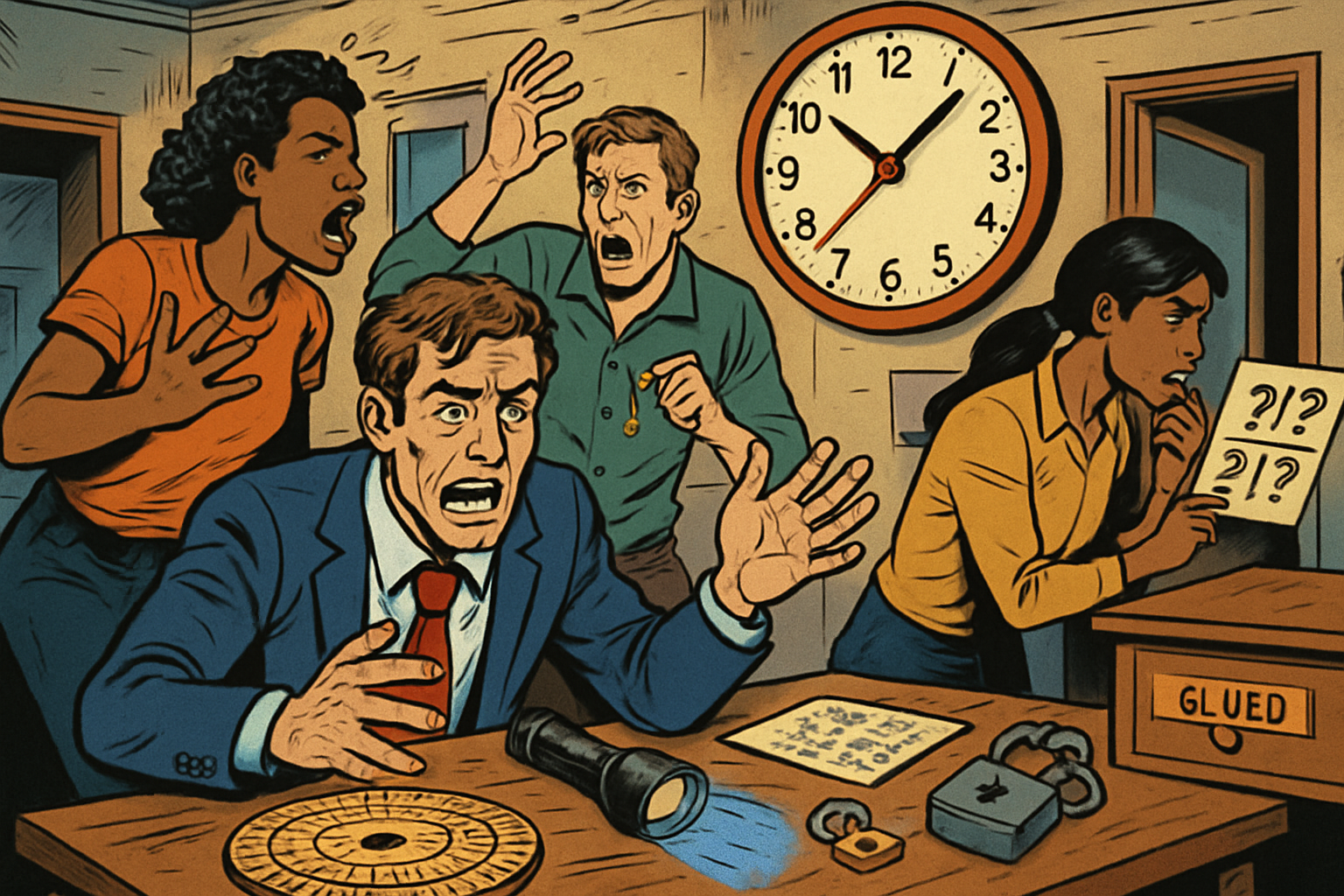We did an escape room. We escaped with 10 minutes to spare.
It was a great team experience. Intense, fast-paced, and full of surprises. We can see how it could have got chaotic, and that is exactly what made it so useful. During the debrief, it hit us: this is what a business crisis feels like.
We help organisations prepare for the unexpected. That is our day job. But in that room, we got a front-row seat to our own response under pressure. And it taught us a few things.
Here is what we learned, in order, and how it mirrors what happens when businesses face a crisis.
1. The Briefing Held Clues
Before the game started, the escape room team gave us a detailed briefing. It included the backstory, the rules, and a few subtle clues. Listening carefully made a difference.
Lesson: In a crisis, the incident responder will be telling you what they know. Listen closely. There are clues in the brief that should guide your response.
2. We Jumped In Too Quickly
We jumped straight in. We did not stop to take stock or map out what we were facing.
Lesson: In a crisis, a damage assessment and situation report are crucial. You need to know where you stand before you start solving problems.
3. Leadership Was Missing at First
Everyone did their own thing. At one point, three people were working on the same clue in different corners. We had no one steering the ship.
Lesson: You need a crisis leader. Someone who sees the whole picture, updates priorities, and keeps the team focused. Not necessarily hands-on, just guiding the response.
4. Communication Was Patchy
No one knew what anyone else was doing. Clues were connected, but we did not realise until too late. People solved puzzles without sharing, and others duplicated effort.
Lesson: Communication is everything. Your BCP should include regular updates, shared status, and a way to keep everyone in sync. Coordination and clarity are just as important as speed.
5. We Focused on the Wrong Clues
We spent ages decoding a message in invisible ink. It was a red herring. The real clue was in plain sight.
Lesson: Without a solid BIA and BCP, your team might chase the wrong things. Know what matters before the pressure hits.
6. Time Pressure Was Real
We had 60 minutes. Every second counted. Same in a crisis, except instead of escaping a fake prison, you are trying to protect operations, reputation, and sanity.
Lesson: Your BCP needs to be built for speed. If you are figuring out priorities during the crisis, you are already behind.
7. Our Team Was Big and Busy
We had a big team. People solved puzzles and did not tell anyone. Others duplicated effort.
Lesson: Keep your crisis team lean. More people means more noise. Less coordination means more confusion.
8. Distractions Slowed Us Down
We spent 10 minutes trying to open a drawer that was glued shut. Not part of the game. Just there to distract us.
Lesson: In a crisis, distractions are everywhere. A badly written BCP can send you down rabbit holes. Know your critical assets and cut the noise.
9. We Made Assumptions
We assumed someone had solved a puzzle. They had not. We assumed a clue was relevant. It was not.
Lesson: Do not assume. Validate. Your BCP should include checks to make sure you are not building your response on guesswork.
10. We Did Not Write Anything Down
We solved clues, forgot them, and had to redo them. It was like Groundhog Day with padlocks.
Lesson: Document everything. Crisis response needs a log — decisions, actions, outcomes. Otherwise, you will lose track fast.
11. We Had Tools, But Did Not Know How to Use Them
There was a UV torch. No one knew what it was for. We had a decoder wheel. It was used as a coaster.
Lesson: Tools are great, if you know how to use them. Train your team. Make sure your BCP includes familiar, usable tools.
12. The Debrief Was Gold
Afterwards, we talked through what went wrong. We missed clues, duplicated effort, and ignored the obvious.
Lesson: Always do a post-mortem. It is where the real learning happens. Your BCP should evolve after every incident.
13. We Would Be Better Next Time
Now that we have done one, we would approach the next differently. We know the pitfalls, how to pace ourselves, and what to fix. We reckon we could easily get our time down.
Escape rooms follow similar patterns, so once you have got your head around one, you will be better at another. The same applies to crises. The more you practise, no matter what the incident, the better you will perform.
Lesson: Experience improves performance. Your BCP should include regular exercising and scenario-based practice. It is the best way to build confidence, sharpen instincts, and improve outcomes.
Final Thought
Escape rooms test your teamwork under pressure. Crises do the same, but with higher stakes and fewer clues. We escaped with time to spare and no clues used, better than 40 percent of teams who attempt that room. But we also saw how easily things could have gone the other way.
Even when you are good at this stuff, there is always room to improve.
The question is: does your BCP help you escape before it is too late?

